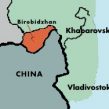
Moscow Tightens its Grip on the Regions as Wealth Declines
Publication: Eurasia Daily Monitor Volume: 6 Issue: 85
By:

On February 26, Moscow ordered an inspection of the Far Eastern Jewish Autonomous Region (Birobidzhan) which borders China. Since 1991, the population of this region has declined by 15 percent, while there has also been a steady influx of Chinese migrants. Now, some local night clubs do not admit ethnic Russians. Nonetheless, it was fiscal issues rather than the rights of Russian nationals that caused anger in Moscow. The regional authorities have been accused of using federal budget transfers to finance Chinese businesses, even if their produce does not reach Russian markets. Chinese farmers, subsidized by the Russian authorities within its territory, are selling their produce in China. Under the protection of the local authorities, the Chinese migrants mine gold and export it to China, with nothing being re-invested within Russia, or taxes paid on the profits (NTV, February 26).
Over the past decade, Vladimir Putin’s policies, federal in name and unitary in substance, deprived units of the Russian Federation of their own money. Not unlike in the "good old" Soviet era, the federal center claimed all the collected revenues, and then decided on the allocation of subsidies. Though such stringent cash control helped keep the local authorities under control, it also badly hurt the Russian economy. In 1999, 31 of the existing 89 units of the Russian Federation functioned as "donor regions," which provided subsidies to support the rest of the country (Novyye Izvestia, March 15, 2007). Now, just 12 regions among the incumbent 84 function as "donors," supporting the rest of the country at Moscow’s discretion (Paralmentskaya Gazeta, March 27, 2008).
As the ongoing systemic financial crisis is markedly worsening, the long subjugated units of the Russian Federation are increasingly displaying signs of discontent. The specter of separatism threatens to become as menacing as it did briefly in the 1990’s. However, this time the separatists will hardly attempt to hoist their banners over regional capitals, and fight federal troops in the way seen in Chechnya. Now, they prefer to claim allegiance to the center, paying lip service to the "Czar and the flag," and make sure their cash flows abroad, rather than go to Moscow.
The Jewish Region is the first such major case on record with Moscow launching a major probe. However, it is an open secret that the Russian Far East’s economy -and virtually its entire foreign trade- is oriented towards China, Japan and South Korea rather than to Russia. Even Putin’s envoy to the Far East General Konstantin Pulikovsky said in 2003 that "the Far Eastern Economy is 80 percent oriented to Asian-Pacific region’s countries, with only 20 percent to Russia" (www.top.rbc.ru, June 20, 2003).
Moscow is now facing the possible risk of losing its Far East and Siberia entirely, both economically, and in the longer term politically. Surprisingly, the federal authorities seem quite indifferent both to the plight of their main and richest territories, or to the serious possibility of their gradual dislocation from the state. Some still believe they can put down any attempt at independence by resorting to crude force, though they fail to show success in the separatist North Caucasus, where they have been trying to crush separatism since 1994.
On April 29, Vladimir Ryzhkov, a scholar from the Altai in Siberia, formerly a liberal deputy in the Duma and now a professor at Moscow’s Higher School of Economics, told the Irkutsk-based Baikalskiye Vesti that Moscow has "cast aside" Siberia (www.politirkutsk.ru, April 29). Ryzhkov made a very strong case, suggesting that Moscow’s policies had turned the formerly prosperous region into a dying territory. According to Ryzhkov, it is now cheaper to fly from Moscow to Western Europe than from the capital to Vladivostok. As a result, Ryzhkov pointed out, "six of the ten poorest regions of the Russian Federation are Siberian."
Ryzhkov sees one basic solution – Moscow must "leave a greater part of the taxes collected there" to Siberia. But that is exactly what Moscow, scared by a potential challenge to its "power vertical," stubbornly refuses to do – increasingly pushing regional elites to seek solutions for their economic ills across the border.
Economic discontent is serving to fuel political tensions. Some major republics within Russia seem to be asserting or preparing new legal grounds for their independence in the event of further trouble. On February 19, the legislature of the diamond-rich Siberian Sakha-Yakutia ruled not to drop provisions in its constitution affirming its sovereignty – and its people as the source of that sovereignty rather than exclusively belonging to the Russian Federation (Kommersant, February 19).
National republics within Russia, such as Sakha, Tatarstan, Bashkortostan, or Chechnya all have similar provisions within their constitutions, which Moscow views as potentially separatist and still cannot remove -even though these federal entities are run by members of the ruling United Russia Party, chaired by Putin. Meanwhile, the ethnic Russian regions, such as Krasnoyarsk or Yekaterinburg (also ruled by Putin loyalists) discuss their withdrawal from the much-touted Putin-Medvedev "national projects," decreed to upgrade Russia. Now, these regions do not want to be part of them, citing the failure of the federal authorities to deliver the promised funds. (www.newsru.com, February 11).
Kaliningrad Governor Georgy Boos, another staunch Putin loyalist, called on Moscow to "increase the independence of the regions" so that they will be better able to combat the consequences of the economic crisis. Moscow remains firmly determined to collect and harshly control the distribution of regional revenues in order to retain its central authority. Meanwhile, the economic potential of the poorer regions is flowing abroad, ironically reducing Moscow’s political influence and power to the point of a dangerous national breakup.




